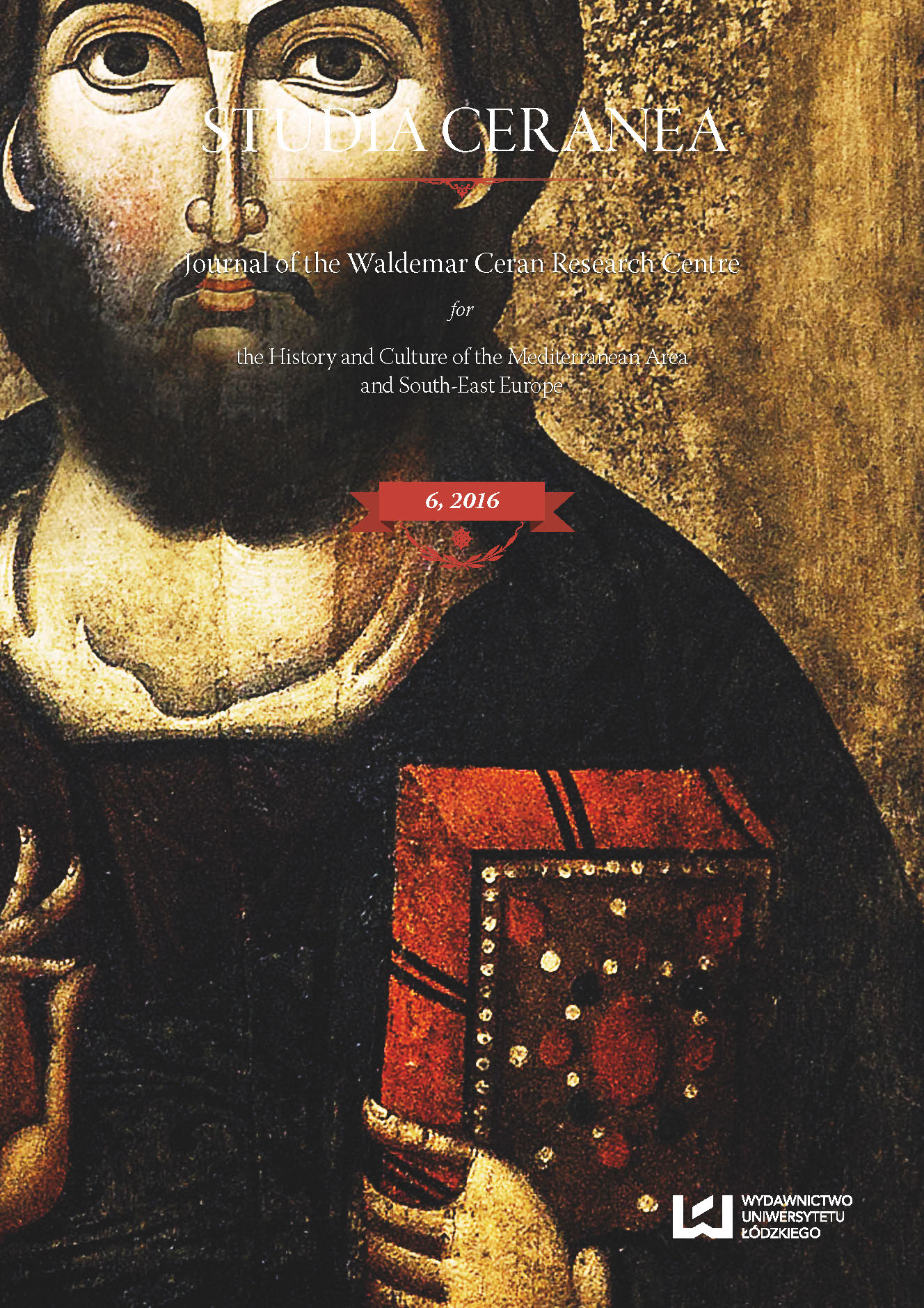The Role of the Bible in the Formation of Philosophical Thought in Kievan Rus’ (as Exemplified by Ilarion of Kiev, Kliment Smolatič, and Kirill of Turov)
DOI:
https://doi.org/10.18778/2084-140X.06.04Keywords:
Kievan Rus’, Russian philosophy, Byzantine culture, Orthodox religion, Ilarion of Kiev, Kliment Smolatič, Kirill of TurovAbstract
The article is an attempt to critically evaluate the manifestations of the philosophical culture sprouting in Rus’. With the baptism in the Byzantine Rite, Rus’ in the 10th century joined the family of Christian nations and defined the future direction of her own cultural development. The Middle Ages in Rus’ were eminently theocentric. Literature (which was mostly translated from the Greek in Bulgarian monasteries) had a religious character. Sacral content, assimilated in Rus’ mainly through the Old Church Slavonic (due to the scarce knowledge of Greek) had a decisive influence on formation of the philosophical worldview of Rus’ intellectual elite. The Bible thus became the main reference framework for the first Rus’ thinkers-philosophers: Ilarion of Kiev († 1055), Kirill of Turov († 1183) and Kliment Smolatič († 1164). Ilarion of Kiev, the first metropolitan of the Kievan Rus’ in his rhetoric work (which postulated the superiority of the New Testament to the Old) expressed a philosophical thesis of the equality of all Christian nations before God. Kliment Smolatič, the second metropolitan of Rus’, in his Letter to Presbyter Foma, defended the allegorical method of interpretating the Bible. Kirill of Turov, in his turn, in his Parable of the human soul and body allegorically tried to answer the question about the relationship of the body and the soul. For the Rus’ thinkers the content of the Bible served as a pretext for philosophical reflection, e.g. on the role of man in the universe, on the nature of reality, on the relation between matter and spirit. In their works we find the beginnings of the theory of knowledge, metaphysics, ethics, and aesthetics.
Downloads
References
Discourses against judaizing Christians, trans. P.W. Harkins, Washington 1979.
Google Scholar
Sermons and rhetoric of Kievan Rus’, trans. S. Franklin, Harvard 1991.
Google Scholar
The Russian Primary Chronicle. Laurentian Text, trans. et ed. S. Hazzard Cross, O.P. Sherbowitz-Wetzor, Cambridge 1953.
Google Scholar
The Works of Dionysius the Areopagite, trans. J. Parker, London 1897.
Google Scholar
Из «Шестоднева» Иоанна экзарха болгарского, trans. Г. М. ПРОХОРОВА, [in:] Библиотека литературы Древней Руси, vol. II, Санкт-Петербург 1999.
Google Scholar
Из Изборника 1076 года, [in:] Библиотека литературы Древней Руси, ed. Д.С. ЛИХАЧЕВ, Л.А. ДМИТРИЕВ, А.А. АЛЕКСЕЕВ, Н.В. ПОНЫРКО, vol. II, Санкт-Петербург 1999.
Google Scholar
Летопись по Ипатьевскому списку, Санкт-Петербург 1871.
Google Scholar
Слово о законе и благодати, [in:] Библиотека литературы Древней Руси, ed. Д. С. Лихачев, Л.А. ДМИТРИЕВ, А.А. АЛЕКСЕЕВ, Н.В. ПОНЫРКО, vol. I, Санкт-Петербург 1997.
Google Scholar
Hryniewicz W., Staroruska teologia paschalna w świetle pism św. Cyryla Turowskiego, Warszawa 1993.
Google Scholar
Naumow A., Apokryfy w systemie literatury cerkiewnosłowiańskiej, PKSł 36, 1976, p. 1–122.
Google Scholar
Thomson F.J., Quotations of Patristic and Byzantine Works by Early Russian Authors as an Indication of the Cultural Level of Kievan Russia, SGa 10, 1983, p. 65–102.
Google Scholar
Tichołaz A., Platonizm w Rosji, trans. H. Rarot, Krakow 2004, p. 36–37.
Google Scholar
БАРАНКОВА Г.С., Античная философия, мифология, научные знания в древнеславянских переводных памятниках и выработка научной терминологии, [in:] Философские и богословские идеи в памятниках древнерусской мысли, ed. М.Н. ГРОМОВ, Москва 2000, p. 22–48.
Google Scholar
БЕЗОБРАЗОВА М.В., Творения Святого Дионисия Ареопагита, Санкт-Петербург 1898.
Google Scholar
ГРАНСТЕРН Е.Э., Почему митрополита Климента Смолятича называли «Философом», ТОДЛ 25, 1970, p. 20–28.
Google Scholar
ЕРМИН И.П., Притча о слепце и хромце в древнерусской письменности, ИОРЯС 30, 1925, p. 323–352.
Google Scholar
КИРЕЕВСКИЙ И.В., О характере просвещения Европы и о его отношении к просвещению России, [in:] idem, Полное собрание сочинений, vol. I, Москва 1911, p. 174–222.
Google Scholar
КУСКОВ В.В., История древнерусской литературы, Москва 1982.
Google Scholar
ЛЕВЧЕНКО М.В., Очерки по истории русско-византийских отношений, Москва 1956.
Google Scholar
ЛИХАЧЕВ Д.С., Великое наследие. Классические произведения литературы Древней Руси, Москва 1979.
Google Scholar
ЛИХАЧЕВ Д.С., Развитие русской литературы X–XVIII в., [in:] idem, Избранные работы, Ленинград 1987, p. 24–260.
Google Scholar
НИКОЛЬСКИЙ Н., О литературных трудах митрополита Климента Смолятича, писателя ХII века, Санкт-Петербург 1892.
Google Scholar
ПРОХОРОВ Г.М., Сочинения Дионисия Ареопагита в славянской рукописной традиции, [in:] idem, Русская и армянская средневековые литературы, Ленинград 1982.
Google Scholar
СЕНДЕРОВИЧ С., Слово о законе и благодати как экзегетический текст, ТОДЛ 51, 1999, p. 43–57.
Google Scholar
СОН ДЖОНГ СО, Еще раз о соотношении двух древнерусских редакций Притчи о слепце и хромце, ТОДЛ 54, 2003, p. 390–401.
Google Scholar
УСПЕНСКИЙ Б.А., Языковая ситуация Киевской Руси и ее значение для истории русского литературного языка, Москва 1983.
Google Scholar
ФЕДОТОВ Г.П., Русская религиозность. Христианство Киевской Руси Х–ХIII вв., [in:] idem, Собрание сочинений в двенадцати томах, vol. X, Москва 2001, p. 8–396.
Google Scholar
ФЛОРОВСКИЙ Г.В., Пути русского богословия, Москва 2009.
Google Scholar














